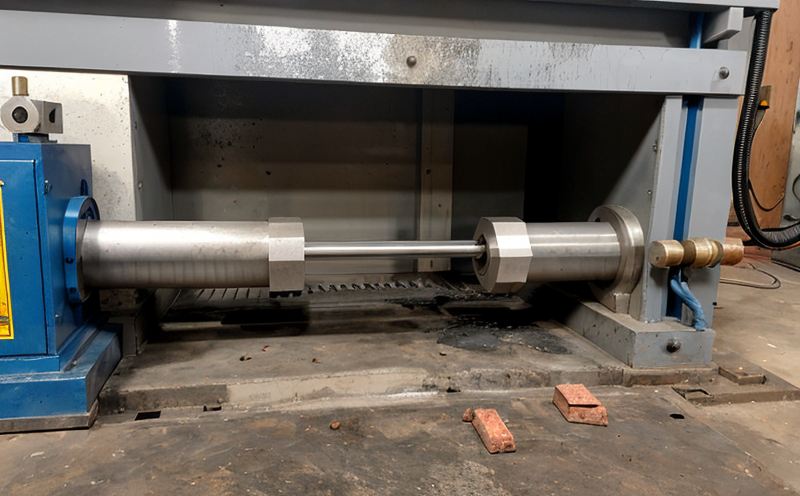ASTM D1525 Vicat Softening Point Testing Precision and Accuracy Evaluation Test
The ASTM D1525 Vicat softening point test is a critical procedure used to determine the temperature at which a specified material, typically a thermoplastic or elastomeric polymer, transitions from a solid to a liquid state under controlled conditions. This test method provides essential information on the thermal stability and processability of materials, making it indispensable for quality control, research and development (R&D), and compliance purposes.
The Vicat softening point is determined by subjecting a specimen to an increasing temperature in a controlled atmosphere until it deforms under the weight of a standard needle. The temperature at which this deformation occurs is recorded as the softening point. This test method is particularly relevant for materials used in automotive, aerospace, and electronics industries where thermal stability plays a crucial role.
Our laboratory adheres strictly to ASTM D1525 standards and employs state-of-the-art equipment to ensure precision and accuracy. The Vicat softening point testing process involves several steps:
- Specimen Preparation: Specimens are cut from the raw material or finished product, ensuring uniformity in thickness.
- Test Setup: The specimen is placed on a flat surface with a standard Vicat needle positioned above it. The sample is then exposed to a controlled environment where temperature increases uniformly.
- Data Collection: The temperature at which the material deforms under the weight of the needle is recorded. This data is used to calculate the softening point.
- Reporting: Results are reported in accordance with ASTM standards, providing a clear and comprehensive understanding of the material's thermal properties.
The precision and accuracy of this test are paramount for ensuring reliable results. Our laboratory ensures that all tests comply with ASTM D1525 requirements, using certified equipment and trained personnel to maintain high standards.
In real-world applications, accurate Vicat softening point data is essential for:
- Ensuring material compatibility in multi-material assemblies.
- Guiding process temperature settings during manufacturing processes.
- Evaluating the thermal stability of materials in harsh environmental conditions.
- Determining the optimal processing window for thermoplastic parts to minimize defects and maximize quality.
The Vicat softening point test is a cornerstone of material science, providing insights into the behavior of polymers under heat. By leveraging this test method, our clients can make informed decisions that enhance product performance, reliability, and safety.
Benefits
The ASTM D1525 Vicat softening point testing precision and accuracy evaluation test offers numerous benefits to industries that rely on thermoplastic materials:
- Precision in Material Selection: By determining the exact temperature at which a material deforms, our tests help clients select materials with appropriate thermal stability for their applications.
- Improved Process Control: Accurate test results allow manufacturers to set precise process temperatures, reducing defects and improving overall product quality.
- Enhanced Product Reliability: Understanding the thermal properties of materials through Vicat testing helps ensure that products can withstand the intended environmental conditions without degradation.
- Compliance with Industry Standards: Our tests are conducted in accordance with ASTM D1525, ensuring compliance and trustworthiness for regulatory submissions.
- Informed R&D Decisions: The data provided by these tests can guide research and development efforts, leading to the creation of innovative materials that meet stringent performance requirements.
- Cost Savings: By minimizing material waste and reducing rework due to improper processing temperatures, clients benefit from significant cost savings.
- Environmental Benefits: Accurate testing ensures that only suitable materials are used in production processes, leading to more efficient use of resources and reduced environmental impact.
The precision and accuracy of our tests ensure that clients can make informed decisions that lead to enhanced product performance and reliability. Our commitment to quality and compliance sets us apart as a trusted partner for material testing.
Eurolab Advantages
At Eurolab, we pride ourselves on providing the highest level of precision and accuracy in ASTM D1525 Vicat softening point testing. Our advantages include:
- State-of-the-Art Equipment: We use cutting-edge equipment that meets or exceeds the requirements set by ASTM standards.
- Trained and Certified Personnel: Our team of experts is highly trained in performing Vicat tests, ensuring consistent results across all samples.
- Comprehensive Reporting: Results are detailed and easy to interpret, providing a clear understanding of the material's thermal properties.
- Strict Compliance: All tests are conducted in accordance with ASTM D1525 standards, ensuring compliance for regulatory submissions.
- Consistent Quality: Our laboratory maintains strict quality control measures to ensure consistent and reliable test results.
- Expert Consultation: Our team offers valuable insights into material selection and processing based on the test results, guiding clients towards optimal solutions.
- Industry Reputation: Eurolab is recognized for its expertise in material testing, contributing to a strong reputation among industry leaders.
Our commitment to precision and accuracy ensures that our clients receive reliable and actionable data, enabling them to make informed decisions that enhance product performance and reliability.
Environmental and Sustainability Contributions
The ASTM D1525 Vicat softening point testing precision and accuracy evaluation test plays a crucial role in promoting environmental sustainability. By ensuring that materials are selected based on their thermal stability, we contribute to the efficient use of resources and reduced waste. This, in turn, helps minimize the environmental impact associated with manufacturing processes.
Accurate Vicat softening point data allows for optimal process temperatures during production, reducing energy consumption and emissions. Additionally, by selecting materials that can withstand harsh environmental conditions without degradation, we contribute to longer product lifecycles, further reducing waste and resource depletion.
In the broader context of sustainability, our laboratory's commitment to precision and accuracy in material testing supports industries' efforts to design more sustainable products. By providing reliable data on thermal properties, we enable manufacturers to make informed decisions that balance performance with environmental responsibility.
Through our expertise in ASTM D1525 Vicat softening point testing, Eurolab contributes to a greener future by promoting efficient resource use and minimizing waste in manufacturing processes. Our commitment to sustainability aligns with the global push towards more environmentally friendly practices.





